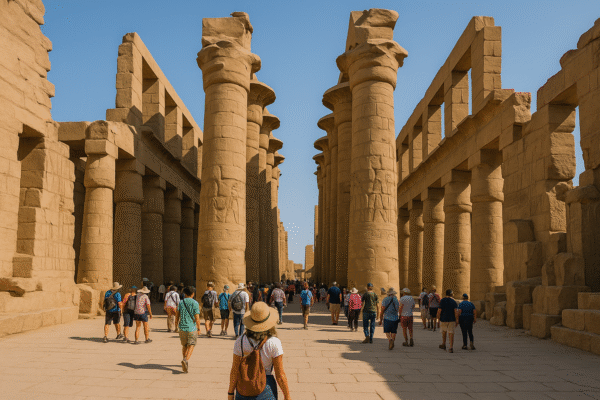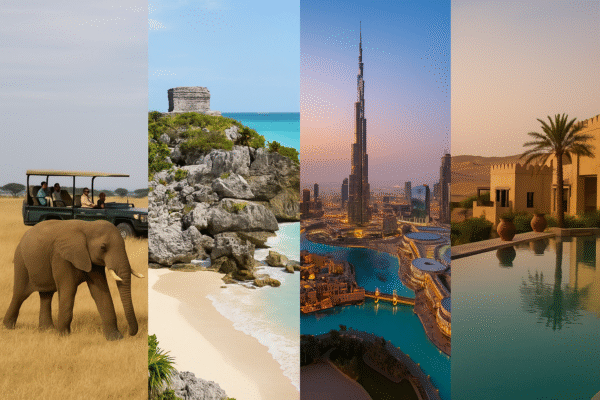Egypt Emerges as 2025 Tourism Powerhouse With Record Growth, Regional Alliances, and Cultural Revival
As golden light pours over Karnak Temple in Luxor and gentle waves lap the shores of the Red Sea, Egypt’s tourism revival has entered full swing. In 2025, the country is witnessing a historic rebound in international visitor arrivals, catapulting it into the ranks of global tourism leaders like Saudi Arabia, Spain, Turkey, and Thailand.
According to the Egyptian Ministry of Tourism and Antiquities, the country recorded a 22% year-on-year growth in tourist arrivals in June 2025, following a groundbreaking 15.8 million visitors in 2024. The momentum has only increased in early 2025, with a 26% surge in inbound tourism during January–May—up from 4–6% growth in the same period the year prior.
Strategic Growth Plan Anchored in Investment and Innovation
This unprecedented upswing is no accident. Egypt’s Vision 2028 tourism blueprint aims to attract 30 million annual visitors through strategic investments, hospitality expansion, and digital innovation.
One of the most significant steps was the government’s EGP 50 billion incentive package announced in December 2023, encouraging private sector investment in tourism infrastructure. Target regions include Cairo, Luxor, Aswan, the Red Sea coast, and the emerging North Coast. The goal: dramatically increase room capacity and elevate service standards across the country.
The economic ripple effect of this initiative is substantial. For every 15,000 new hotel rooms built, Egypt anticipates generating up to EGP 4 billion in combined VAT and commercial tax, while also boosting local supply chains and creating thousands of new jobs.
Global Endorsements Boost Egypt’s Travel Appeal
International confidence in Egypt’s safety has also played a key role. As of July 2025, both the U.S. and U.K. upgraded Egypt to the same travel advisory category as France and Germany—“Exercise Increased Caution”—marking a diplomatic nod to the country’s growing stability and safety for tourists.
This has been critical for Egypt’s popularity among European markets, especially the nearly one million British travelers who visit each year. Strong relations with Gulf countries and regional tourism leaders like Saudi Arabia, UAE, and Jordan have further reinforced Egypt’s visibility on the global tourism map.
High-Profile Investment Pacts Spur Hotel Development
In June 2025, Prime Minister Mostafa Madbouly announced a $265 million Memorandum of Understanding to develop new hotel rooms and branded residences in tourism hotspots. Egypt aims to add 18,000 rooms by the end of 2025 and over 200,000 by 2028, in line with its ambitious visitor targets.
These hospitality developments are expected to enhance Egypt’s tourism experience, offering upgraded facilities that meet global standards, while simultaneously generating local employment and fostering sustainable regional development.
Eco-Tourism and Safari Expansion Capture New Markets
Egypt is also tapping into the global demand for nature-based and sustainable tourism. More than 20,000 tourists participated in safari and eco-tourism programs in early 2025, with excursions to Siwa Oasis, the Red Sea Mountains, and Western Desert gaining popularity.
From desert safaris and wildlife observation to eco-lodge stays and cultural immersion, these niche offerings are helping to spread tourist traffic beyond major cities and promote year-round travel. They also empower local communities, foster environmental awareness, and reduce pressure on over-touristed sites.
Egypt Joins the Ranks of Global Travel Leaders
Egypt’s tourism rise reflects a broader global trend. Saudi Arabia saw arrivals surge 102% in Q1 2025, powered by Vision 2030 megaprojects like NEOM. Spain, Turkey, Morocco, the UAE, and Italy all reported record-breaking summer bookings. Thailand and Jordan posted high numbers due to relaxed visa rules and better air connectivity.
In this context, Egypt now stands shoulder to shoulder with global tourism leaders, benefiting from international travel’s full recovery post-pandemic.
A Human-Centered Revival: Jobs, Livelihoods, and Cultural Preservation
Tourism’s return is more than an economic statistic—it’s a human story. In Luxor, guides who once faced pandemic-induced unemployment now lead daily tours through pharaonic temples. In Hurghada, hotel staff greet full-capacity guests with a renewed sense of purpose.
Ahmed, a 28-year-old hotel manager in Sharm El-Sheikh, shared, “Our rooms have been fully booked for weeks. We used to wonder if tourists would ever come back. Now, it feels like a new chapter.”
Amina, a potter in Aswan, said tourists are once again buying handmade goods in her workshop. “It’s not just income—it’s recognition of our culture.”
Facing the Future: Challenges and Resilience
Despite its success, Egypt faces ongoing challenges. These include over-tourism in iconic destinations, the need for transport infrastructure upgrades, and workforce training. The government is actively working to resolve these through smart scheduling, sustainable destination planning, and upskilling programs for tourism professionals.
Digitalization is also a top priority. Egypt is rolling out smart tourism apps, contactless payment systems, and centralized visitor platforms to improve accessibility and safety for international travelers.
Conclusion: Egypt’s Tourism Renaissance Is Just Beginning
As the sun sets across the Nile and the call to prayer echoes through Cairo’s skyline, Egypt’s renaissance is visible not only in ancient monuments but in the optimism of its people and the smiles of its guests.
In 2025, Egypt is not merely recovering—it is thriving. Through strategic planning, global cooperation, and cultural authenticity, the country has reasserted itself as a beacon of tourism in the Middle East and beyond. With millions more travelers expected, Egypt’s journey is far from over—it is a story the world is ready to be part of.
For more travel news like this, keep reading Global Travel Wire






















